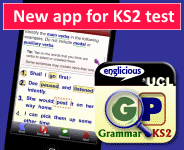Topic: Subject
These resources relate to the grammatical function Subject. A Subject is often (but not always!) a noun, pronoun or noun phrase that comes straight before the verb, and is the person/thing that is doing the action or what the clause is about.
Englicious contains many resources for English language in schools, but the vast majority of them require you to register and log in first. For more information, see What is Englicious?

